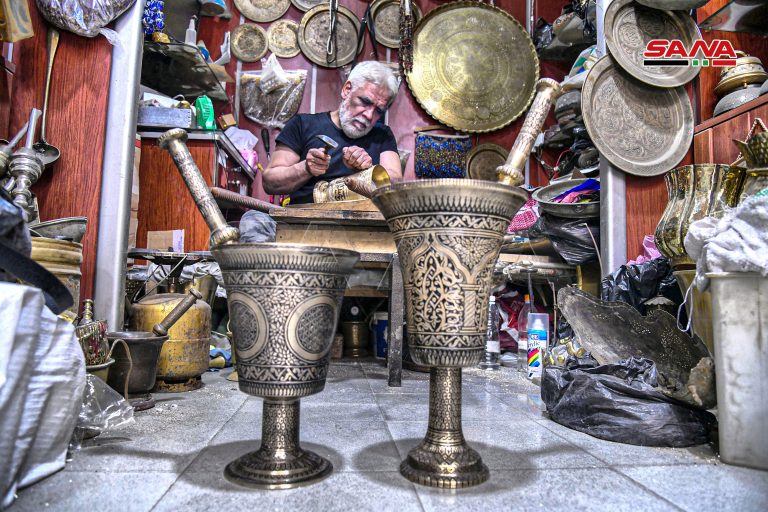Engraving on Copper still Provides Unique Damascene Masterpieces showcased at Arab and European Homes
Damascene artisans were known for making the finest copper engraved vessels which along with other engraved items eventually turned into decorative pieces..
Today and in spite of the technological advances in production processes , copper engraving as a handicraft is still present throughout Damascus Old City.
An iron hammer, pens for engraving and planning, a wooden base and a compass are the tools with which the craftsman Ayman Zarda begins his daily journey to make a Damascene copper masterpiece that later works its way and settles in one of the Syrian, Arab or European homes.
 Between antique copper pieces with the smell and dust of the past, Zarda spends his time working in the middle of his shop at the ancient Medhat Pasha market with the distinguished sound of carving which comes from his small hammer with which he carves on a copper piece in front of him.
Between antique copper pieces with the smell and dust of the past, Zarda spends his time working in the middle of his shop at the ancient Medhat Pasha market with the distinguished sound of carving which comes from his small hammer with which he carves on a copper piece in front of him.
Zarda told SANA reporter “First we select the piece that we want to work on and draw the initial lines to start engraving. Then, the outer frame of the drawing chosen by the customer is determined, next we engrave the tracks and we dry the specified drawing to highlight it further, until the last step in which the copper piece is polished with special materials to show the shine”.
The profession of engraving on copper that Zarda, who is “one of the few craftsmen who still practice this profession in Damascus”, inherited from his father since the seventies and continued to embody it even today despite the change in its use over time and the modifications that made to the shapes of copper and its inscriptions.
According to the artisan Zarda, the tradition of the profession has not forgiven its position by preserving the daily use of engraved copper pieces, as it was previously known, and today most of the copper engraving products have turned into traditional decorative tools which many Syrians still want to acquire as masterpieces to showcase at homes or as gifts to expatriates, or they are exported to Arab and European countries .
Despite the decline in the spread of the profession in the modern era, the options available for the shapes and pieces of engraving have become more variable , as Zarda mentioned. “In the past we used to work within a narrow range such as household utensils and trays, but nowadays options have become more available, such as engraving on copper grates, coffee Dallah ( traditional Arabic coffee pot) , in addition to decorating paintings, chandeliers and incense burners, Copper boxes and lamps”.
He underlined “ Exporting outside Syria has become wider because of the fame of the Damascene inscription extended to the Arab world and Europe, and many of our customers were foreigners. ”
Engraving on copper requires great effort, focus and accuracy, as the period of work on a single piece ranges from three days to a week depending on the size of the piece and the method of engraving and the customer’s request according to Zarda.

The craftsman added some people ask to write words of wisdom on the copper piece or their names or a specific drawing of their own..
He pointed to the danger of extinction of this traditional handicraft due to the new generation’s lack of interest in learning it , which requires great efforts to support it and encourage young people to learn it.
The craftsman Zarda said with the heartbreak of the lover: “There is a real problem because the younger generation does not care about heritage works because they are tiring and do not provide a big income “.
He reiterated the importance of raising awareness about the importance of preserving this traditional handicraft because it is one of the distinguishing features of the Syrian identity.
“ Although it is an arduous profession , Damascene engraving on copper is characterized by beauty , accuracy , skillfulness and deep-rootedness for thousands of years. I am eager to continue working in this profession” the craftsman Zarda concluded.
Rawaa Ghanam

